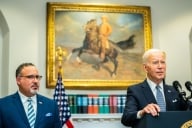You have /5 articles left.
Sign up for a free account or log in.
The National Collegiate Athletic Association placed the University of Kansas on three years' probation for a series of rules violations, including academic fraud and significant payments to athletes, involving three of its most visible sports teams. The NCAA's Division I Committee on Infractions ratcheted up penalties that the university had imposed on itself last summer, after the NCAA panel concluded that Kansas officials had lacked institutional control over the sports program.
More than a year ago, Kansas officials announced that their own internal review had uncovered evidence, among other things, that a former graduate assistant football coach had given two prospective athletes answers to test questions for correspondence courses they were taking on the university's campus, and that boosters gave gifts to graduating men's basketball players with the knowledge of the university's then head coach, Roy Williams.
Those findings led the institution to give itself a two-year probation and to impose relatively minor scholarship reductions on its football and women's basketball teams, in which it also found some rule breaking. Kansas officials subjected coaches and players in its men's basketball program -- the university's most visible and renowned team -- only to undergo more rules education.
The NCAA's own review added one significant additional violation, a major one in the association's eyes: "lack of institutional control." It found that although an outside auditor Kansas hired in 2001 had urged the university to upgrade its athletics compliance staff -- which consisted of one full-time person in a program of 500 athletes and staff members -- sports officials had ignored requests by university administrators and made no meaningful changes until 2003, when Lew Perkins was hired as athletics director. By that time, the NCAA concluded, a slew of additional minor violations had occurred, and other breaches that should have been discovered had not been.
"This failure to implement the recommendation was one reason why serious violations occurred in the athletics program," the infractions panel wrote in its report in the case. "The breakdown in communications and the failure of the compliance office to meet its responsibilities -- coupled with the then director of athletics ignoring the need to upgrade the compliance effort -- are clear indicators of a lack of institutional control."
The finding of lack of institutional control in this case is particularly noteworthy because Kansas's chancellor, Robert Hemenway, has throughout this period been a leader in the NCAA's own reform efforts. From 2002 to 2004, he chaired the associations' Division I Board of Directors.
Although the Committee on Infractions said it had mitigated the penalties it might have imposed in the case because Kansas officials have taken the cleanup seriously since 2003, including self-reporting virtually all of the violations, the panel still added to the university's own menu of punishments.
In addition to the extra year of probation (which subjects the university only to heightened scrutiny and reporting), the NCAA decided to reduce the number of initial scholarships Kansas' football team can award by three in the 2007-8 and 2008-9 seasons, on top of the one-scholarship reduction Kansas had imposed on itself for the 2005-6 and 2006-7 seasons. (Kansas itself also limited the number of two-year-college transfers it will let the football team sign.)
Although "substantial major violations were found to have occurred in the men's basketball program" -- a booster gave gifts or other benefits amounting to about $5,000 to two players -- "the institution imposed no sanctions upon this program," the panel said in its report. The NCAA committee, instead, stripped the Jayhawk team of one scholarship a year for two seasons and also restricted the number of paid campus visits the program can provide to players it is recruiting.
The former graduate assistant football coach who engaged in academic fraud will be forced to appear before the infractions committee if he seeks work at an NCAA member college within the next three years.
Hemenway said at a news conference Thursday that Kansas accepted the NCAA's penalties. "Very little in the committee's report surprises us, because not only did we report these facts to the NCAA, we also thought them serious enough to impose penalties upon ourselves that we thought were appropriate at the time," he said. "The committee confirmed what we have said from the beginning: Serious violations occurred. The committee accepted our self-imposed penalties, and in some cases added their own. But the committee has been very fair with us. We trust the process, and we accept the committee's judgment."









